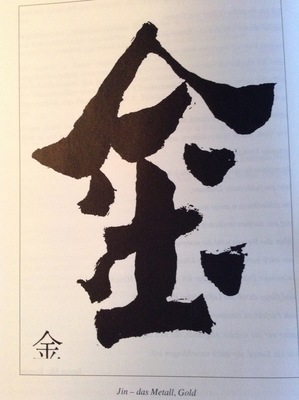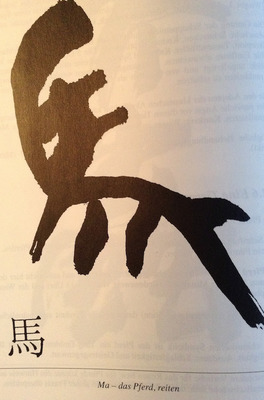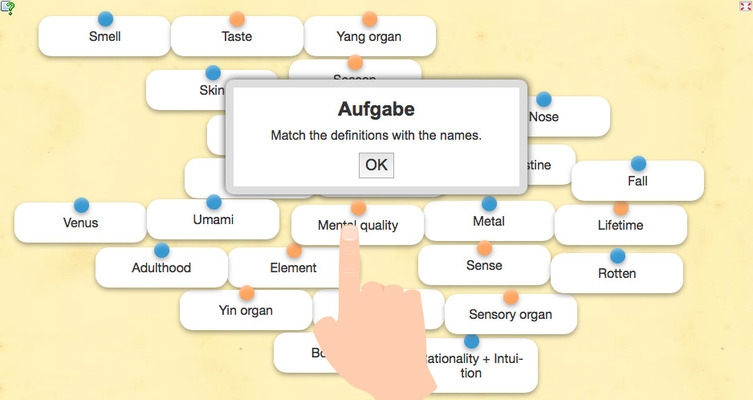Metal
The element metal symbolizes most obviously hardness and structure in life. Every living being reflects the element metal in its outside form.
In the Sheng cycle of the five phases of change, the earth is the mother of the metal and the metal is the salt ort he essence of the earth. It symbolizes everything that is concentrated and hard, that has structure and form as well as value and quality. It is obedient and changeable, just like the hot metal takes the form of the mould and becomes hard when cooling down.

In nature the element metal shows the movement in the year that starts the harvest in autumn. It generates joy when we see the bounty of colours, forms and structures autumn offers us. But it is also the time when the temperatures get cooler, the time of decay and decline, plants are wilting, leaves turn brown and fall down thus turning into the new soil that nourrishes the coming life in the next year. It is the time of judgment and justice when everything is cleaned, sorted out, finished, evaluated.
The element metal is related to the changes in autumn, but also to communication and transport. Metal shows its value in everything that is conducting, roads for traffic, bridges connect regions that are separated by rivers, rails connect the whole world. Cables consist of metal and conduct electricity as well as human communication via telephone.
Money is made of metal – gold, silver, copper – so money makes the world go round. Jewels are related to the element metal as well.
The element metal is related to the Western direction and dryness, the colour white and refreshing coolness. Its related planet is Venus, the smell is musty (like rotten meat) and the related number is nine. The animals related to the element metal are those with scales (insects, worms, snakes, snails, crabs, mussels, reptiles), the domestic animal is the horse. The Chinese word Ma means as well the horse, the stallion, the mare and riding a horse.

The taste that is related to the element metal is spicy and hot (i.e. highly seasoned with hot spices). The Chinese word Xincan also mean bitter, rude, severe, offending and arduous. In the voice, the element metal generates wailing and complaining and the related emotion is sadness. The spontaneous reaction related to the element metal is coughing or intransigent strictness (the sign Su Sha consists of reverence and cutting off or killing). The virtue that is related to the element metal is justice (treating other humans in the right way), the sense of duty (everything that is necessary to adapt oneself to the exigences of living in a community).
The element metal is related to the rice (Chinese: Dao), to the peaches, the onions (Chinese: Chong Bai, which is also used as a symbol for clever).
The element metal shows its splendour in the skin and the hair that covers the body (= fur), opens to the outside in the nose and it is related to the lung and the colon. The lung produces and stores the energy for the body and the colon eliminates the garbage. The lung gives the body rhythm with its breathing. The rhythm can be seen in all rhythmic activities of the body – breathing, walking, speaking, dancing – but also in the rhythm of sleeping and wakening, rational thinking and intuition or being awake and dreaming. Losing one’s own rhythm makes the person helpless against other influences or even illnesses (like catching a cold). The colon eliminates everything that is not needed any more, it shows the way to go. Only then changes can happen, physically as well as mentally. It is the colon that shows the way, that announces the Dao.
Sources
Udo Lorenzen / Andreas Noll, Die Wandlungsphasen der traditionellen chinesischen Medizin, Band 2, 1994 München
Let's play:
